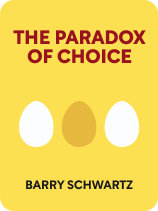

This article is an excerpt from the Shortform book guide to "The Paradox of Choice" by Barry Schwartz. Shortform has the world's best summaries and analyses of books you should be reading.
Like this article? Sign up for a free trial here .
Is there a link between depression and decision-making? Are people happier when they have less control over their lives?
According to Barry Schwartz, the author of The Paradox of Choice, the more decisions you have to make and the more options you have to weigh, the more anxious and depressed you become. That’s not to say that he thinks your life should be controlled—but he does believe that people are happier when they have a more limited selection of options.
Continue reading to learn why Schwartz thinks expanded choice is contributing to the rise in depression rates.
Depression and Choice
How are depression and decision-making connected? Well, while our responses to losses of control can shape our mental health, Schwartz argues that our society sets us up for psychological trouble through excessive choice and overemphasis on individualism.
Middle-class Americans (and those in comparable market democracies) technically have more control and choice than ever before. Yet depression and suicide rates have risen consistently, especially among young people. Since feeling in control is linked to mental health, this can seem contradictory.
However, Schwartz believes that rising depression and general unhappiness are linked to rising expectations of choice and control. As we’ve become accustomed to great degrees of control over our lives, we expect even more control. Since our expectations are high, we’re increasingly likely to be disappointed. Schwartz points out that societies where people have less control have not seen rising rates of depression comparable to countries like the U.S., suggesting that their lower expectations for control may play a role in determining their overall satisfaction with life.
Along with control, individualism and personal responsibility have been rising as cultural values. As a result, we are taught to seek excellence, and when we fail, it becomes easy to blame ourselves, even when we aren’t totally in control of our circumstances. The national preoccupation with thinness and weight loss is an example of this: Though none of us are totally in control of our appearance and weight, our culture has convinced us that we are.
Another negative consequence of individualism is fraying social ties. Schwartz has already discussed the positive health benefits of strong social ties. Since individualism now takes precedence over social ties, he argues that more people have become isolated, causing dissatisfaction and loneliness.
| Rising Rates of Depression Since the book’s publication in 2004, depression in the United States has continued to rise. This is particularly notable among young people, as 15.08% of American youth experienced a major depressive episode in 2019, a 1.24 % increase from the previous year. Based on Schwartz’s ideas, it makes sense that an individualistic culture can lead to a greater likelihood of depression. There’s even evidence that people who live in collectivistic societies are genetically less likely to experience depression. Rising depression, however, cannot solely be attributed to the issues of an overload of choice and reliance on individualism that Schwartz focuses on. Numerous other societal issues can impact mental health—for example, people who belong to groups that experience oppression or discrimination tend to have higher rates of mental health issues. Among them, L.G.B.T.Q. youth are more likely to experience depression than cisgender and heterosexual youth, and young girls are more likely to experience depression than boys. |
Individual Success vs. Social Failure
Schwartz adds a caveat to this conclusion: Individualism, heightened control, and expanded choice can strongly benefit certain individuals.
Everyone is distinct psychologically, and certain people are well-suited to meet these values and create fulfilling lives for themselves. However, even if some individuals thrive, Schwartz contends that this does not negate the broader social damage incurred by these values.
| Happiness, Individualism, and Consumerism In his 2018 book The Happiness Fantasy, Carl Cederström argues that those who promoted individualism and expanded choice are most likely to benefit from them. Cederström contends that counter-cultural movements in the 1960s popularized the ideas of self-fulfillment as a path to happiness. This perspective was co-opted in the following decades by corporations, who geared their marketing toward the promise of individual fulfillment, while political leaders perpetuated the idea that individualism and consumerism can lead to happiness. Cederström doesn’t believe that contemporary ideas of individualism, consumerism, and uninhibited freedom of choice lead to happiness, although they underlie the idea of happiness in Western societies. Corporations stand to benefit the most from values like individualism and freedom of choice in the market, so it’s logical that they shaped these ideas. Cederström also notes in an interview that, anecdotally, the people he found who were most satisfied with this vision of happiness were men. While Schwartz writes that individuals who thrive with individualism and expanded choice are basically anomalies, Cederström would likely argue that they stand to benefit most from these values: Essentially, they’re the people and groups who have the most power socially. |

———End of Preview———
Like what you just read? Read the rest of the world's best book summary and analysis of Barry Schwartz's "The Paradox of Choice" at Shortform .
Here's what you'll find in our full The Paradox of Choice summary :
- Why the more choices we have, the more stressed and indecisive we feel
- How to better navigate our choices, from groceries to health insurance
- Whether it's better to seek the best or accept "good enough"






